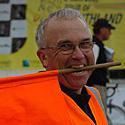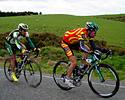News feature, November 16, 2005
Southland director defends stage truncation
By John Stevenson

|
Bruce Ross, race director of the Tour of Southland, has defended his organisation's controversial decision to shorten last week's eighth stage of the New Zealand race. The stage was stopped with 48km to go at the top of Blackmount Hill because weather conditions meant it would be dangerous for the race to ride down off the mountains.
"When the race was stopped the descent would have been dangerous," Ross told Cyclingnews. "Also the race was behind schedule [for the planned traffic closure at the finish.]"
Riders were loaded into vehicles and driven to a point 24km from the finish where the race was restarted. A dispute arose because the restarted race preserved the time gap of three riders who had previously escaped from the peloton. On the top of Blackmount Hill, Anthony Chapman (Creation Signs), Gordon McCauley (Trek/Zookeepers Café), and Jaaron Poad (Trek/Zookeepers Café) had an advantage of four to five minutes on the peloton, a gap that had dropped from around seven minutes as the peloton had organised a concerted chase.
When the race was restarted with 24km to go, Chapman, McCauley and Paod were given a head start equal to their margin at the top of Blackmount. In protest, several teams staged a go-slow protest, including the Calder Stewart squad of race leader Jeremy Vennell and the Southland Times outfit of Cyclingnews diarist John Lieswyn.
Despite the protest, Ross doesn't believe there was any alternative. "People have been talking about a Duckworth Lewis rule, but how do you judge that? There was a bunch chasing three riders, but who says they would have caught them?"
What mystifies Ross is that when the race was restarted, the leaders of the previous chase refused to race and effectively neutralized any pursuit. "Why did they not race the final 24km," said Ross, "that's what's puzzling to me."
Ross stressed that the decision was made for safety reasons. "I respect the riders' ability to race but I do expect the same respect for the race organisation. If anything happens for safety reasons it's my neck. We had to make a call in the best interests of the race."
The decision to cut a section out of the race was heavily criticized by John Lieswyn in his diary on Cyclingnews. Lieswyn's main point of contention was, "whether the riders knew officials were going to stop the stage at the summit of Blackmount. Organizer Bruce Ross should have called a team manager meeting before the stage start to discuss this possibility," he wrote.

|
"He cannot expect riders to hear a shouted warning at the start line, not with diesel engines clattering away, motorbikes running, press camera interviews happening moments before the start, and above all the howling wind making his voice unintelligible. The fact is that only a few teams equipped with radios heard about a possible stop and that wasn't until 20 minutes before the mountain. Riders had no idea whether we would be restarted or the stage cancelled. Gordon McCauley saying that "we read the race right and the others didn't, too bad" is opportunistic at best."
Ross told Cyclingnews that he had used a bullhorn to warn riders at the start that the stage might have to be stopped at the top of Blackmount Hill.
Support for Ross
Ross and his team's decision has been supported by Rob Young, manager of the MG XPower presented by BigPond team. In a post-race email, Young accused the riders who protested of, "very poor sportsmanship ... as the leading teams took their protest public (on national TV) and implicated the remainder of the peloton by chasing down anyone who tried to race, abusing and attempting to intimidate them. As a consequence the main field arrived 17 minutes after Macauley, and the lead teams forfeited any chance of winning the race. It was a disgraceful display."
"A number of riders continued with their appalling behaviour by questioning in the media the professionalism of the race officials, and even their honesty," wrote Young. "The reality, in our opinion (and given the evidence), was that the teams gambled with the risk of the stage being suspended. The prudent thing to do would have been to keep Macauley within 2 or 3 minutes so that they could bring him back quickly if required. Instead they let one of the most threatening riders in the race establish a 7 minute lead, and then complained when the much-discussed suspension of the stage occurred."
Young was lavish in his praise of the event. "The Tour of Southland is a brilliantly organised race, with tremendous community support and a highly professional race committee," he wrote, "Further, the race was overseen by a UCI commissaire, Hong Kong's Walter Yu, who was ultimately responsible for making the decision to suspend the stage (in consultation with the NZ Police and race management). To suggest the organisers were favouring Gordon Macauley is absurd."
What to do?
The question remains, though, of how race organisers should deal fairly with a situation where a race is stopped and restarted at a shorter distance. This is not a common event. Early season races in Europe are often shortened because mountain roads are impassable due to snow, as happened when stage 2 of this year's Paris-Nice was shortened from 190km to just 46.5km. But two very experienced race promoters contacted by Cyclingnews could not remember a situation where a race had been stopped, ferried down the road and started again.
Phill Bates, organiser of Australia's Commonwealth Bank Classic for many years, and event promoter at the Dunc Gray Velodrome, said he'd never been in Ross' situation. "I've never shortened a race but the fair thing to do would be to reduce the gap proportionally," he said. "So if they had four minutes at 48km to go it should have been reduced to two minutes when they restarted."
In his career as a race promoter, Bates said he had twice encountered weather conditions so severe that he had chosen to cancel a stage. "Once, riders were suffering from hypothermia, the other the wind was coming off the ocean. They were criteriums so I was able to run the stages the next morning."
Bates recalled a situation from the 1988 Milk race in the UK when a train separated the break from the chasing bunch. "Eventually they stopped the leaders because the bunch was going to have to wait for something like 12 minutes!" Officials restarted the race when the leaders had waited for as long as the chasing bunch.
John Craven, managing director of Caribou Publications and race director of many UCI-level races in Australia, said he'd not encountered a similar situation in any of the races he'd run in Australia, such as the Herald-Sun Tour, where bad weather had made him stop a stage, and then re-start it further up the course.
"That's a contentious one," he said about the eighth stage of the Tour of Southland. "Stopping the race and car-lifting the field up the road? I would need to be absolutely convinced the riders' lives were in danger before I would allow a race to be stopped, so I reckon it must have been blowing," he said.
As for a rule pertaining to preserving or adjusting the time gap of a break-away group, Craven said he was unaware of any where the race organisers decided to stop a stage or race, and then re-start it.
He said he'd only had to adjudicate when a race was interrupted by train crossings. He said if a break-away group was held up by a train crossing and the main field caught them, or significantly reduced their lead, he would preserve the lead of the break. On the other hand, if the peloton was held up by a train and the break was up the road, "that was just bad luck".
"In those instances (where a race is interrupted), my sympathies always rest with the riders who are at the front and they deserve special consideration; they are creating the race," he said.
At press time, the UCI had not responded to an emailled request for comment on the situaiton of a race being interrupted and restarted.

